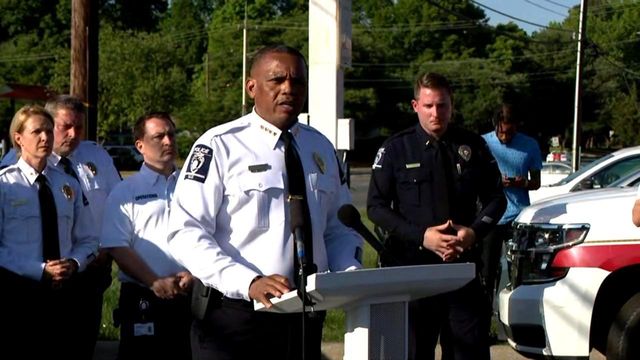‘You Have to Disobey’: Protesters Gather to Defy Stay-At-Home Orders
As President Donald Trump and some of his supporters push for a more rapid return to pre-coronavirus economic activity, protesters in several states took to the streets this week to urge governors to relax the strict rules on commerce, work and daily life that health officials have said are necessary to save lives.
In Michigan, thousands of demonstrators mobilized by conservative groups created a traffic jam on the streets around the state Capitol in Lansing, saying restrictions to prevent the spread of the virus were dooming small businesses. In Frankfort, Kentucky, dozens of people shouted through a Capitol building window, nearly drowning out Gov. Andy Beshear, a Democrat, as he held a news conference. And in Raleigh, North Carolina, at least one woman was arrested during a protest that drew more than 100 people in opposition to a stay-at-home rule, The News & Observer reported.
More protests against stay-at-home orders have been planned in other states, including Texas, Oregon and California, as the economic and health effects of the coronavirus mount across the country. In the last four weeks, more than 22 million Americans have filed for unemployment benefits. Still, public health experts warn that returning to normal behavior too soon — particularly with continuing testing shortages — could exacerbate the spread of the virus, which has killed more than 30,000 people in the United States.
The rallies reflected both economic frustrations and political divides. At recent rallies in Ohio, New York and Michigan, many organizers and demonstrators, some who came armed, were aligned with anti-government activists on the right and libertarian groups. Some had affiliations with the Tea Party and displayed the “Don’t Tread on Me” logo that was an unofficial slogan for the movement. At least one protester in Michigan waved a Confederate flag with the image of a gun. Others waved banners in support of Trump, and protested Gov. Gretchen Whitmer, a Democrat who has been a target of Trump’s ire, by chanting “Lock her up.”
Polls show that most Americans support restrictions meant to combat the virus. In a recent Pew Research survey, 66% of respondents said they were worried state governments would lift restrictions too quickly. But, in a deeply divided nation, the size of the protest in Michigan, and the appetite in other states for more rallies, suggested that anger over the no-end-in-sight nature of the lockdowns was not limited to the far right, and that for many not directly touched by the virus, patience has a limit. The demonstrations play out as governors around the country face increased pressure to loosen some of the restrictions.
In Michigan alone, more than 1 million people — roughly a quarter of the state’s workforce — have filed for unemployment benefits.
Greg McNeilly, a Republican consultant in the state who has criticized the governor’s response as too sweeping, said that while the protests this week included fringe elements of the right, politicians would be mistaken if they dismissed them outright.
“At the heart of this is legitimate concern that, look, we can’t beat this virus without a vaccine or herd immunity,” he said. “And right now it feels like our policymakers, state and federal, are choosing fear instead of saying, ‘How can we live safely with this?’” McNeilly said he thought governors who did not demonstrate more flexibility risked turning Americans against their elected officials at a time when trust in government is crucial. “Our institutions have not been sitting on a surplus of trust,” he said.
Whitmer has tried to tie the protest to Betsy DeVos, the nation’s education secretary, noting that one of the host groups, the Michigan Freedom Fund, was linked to the DeVos family, though there is no evidence that DeVos herself provided any support for the protest.
On Wednesday, Whitmer said that the protesters were in the minority among Michiganders and that the rally, which was also hosted by the Michigan Conservative Coalition, was primarily a political gathering.
“It was a political rally that is going to endanger people’s lives, because this is precisely how COVID-19 spreads,” she said on MSNBC.
Many of the rallies across the country reached people through conservative Facebook pages and personalities who promoted the events. Suzzanne Monk, a political activist in Washington, D.C., who advocates for Trump, said she had created the ReOpen America page on Facebook, and a corresponding political action committee, after hearing from people who had lost their jobs because of the shutdowns. On her page, she shares videos from conservatives and promotes the creation of state-specific events.
“Please join a group in your state if there is one,” she wrote in one post. “If there isn’t, MAKE one.”
One of the first substantial protests, in Columbus, Ohio, on Monday, was organized through similar Facebook groups. It was also given a boost by prominent local conservatives like Melissa Ackison, a Republican candidate for state Senate and a supporter of Trump, who said she promoted the event on her social media accounts, on talk radio and through her campaign’s email list.
“We can shoot things out and rile people up quickly,” Ackison said. She was pictured among the protesters screaming through the Columbus Statehouse doors in a widely circulated photograph from The Columbus Dispatch.
After growing pressure from Republican lawmakers in the state, Gov. Mike DeWine, a Republican, said on Thursday that some businesses that had shuttered could begin to reopen on May 1.
In an interview Tuesday, DeWine acknowledged the vocal group of people calling for governors to relax their restraints.
“There’s an understandable pressure for people to want to move on, and I don’t blame them,” he said. “But as governor, I’ve got the responsibility of making sure we do it a reasonable way, a way that protects people as much as we can, being also mindful that a broken economy can also be lethal.”
Polling has shown divides between Democrats’ and Republicans’ responses to the virus. One Gallup poll found that a higher share of Democrats said they had avoided public places and small gatherings than did Republicans. Still, a vast majority of Americans have limited their behavior and have said the government should be more focused on stopping the virus than keeping the economy running.
Tyler Miller, 39, an engineering technician in Bremerton, Washington, said he was surprised by the number of people who signed up to attend a rally he organized for this weekend at the state Capitol in Olympia after growing frustrated with limitations on gatherings and travel. Miller said in an interview that he believed that Americans should take the virus seriously, noting that even as he wrote to Gov. Jay Inslee, a Democrat, to complain about the restrictions, he had self-quarantined at home after experiencing coronavirus-like symptoms.
“I want the governor to say that these are strongly encouraged practices, but that people have the right to gather,” Miller said. If the state-mandated rules were to be revised, he said, he would call off the rally. “I want people to be as safe as possible, but I also want their liberties to be respected in the process.”
Other organizers were more blunt in their calls to action.
“You have to disobey,” Wayne Hoffman, president of the Idaho Freedom Foundation, a nonprofit organization that advocates smaller government, said after Gov. Brad Little, a Republican, announced he would extend a stay-at-home order until the end of April. Idaho has recently seen growing discord over government mandates, and three conservative groups, including Hoffman’s, have planned a protest for Friday at the state Capitol in Boise.
“You have to do what’s best for your business,” added Hoffman. “You have to do what’s best for your employees and your customers. You have to do what’s best for your livelihood, for your families.” For some conservative protesters, the rallies are about more than reopening state economies. They are an outlet to express their anger, which is in some cases fueled by conspiracy theories.
Owen Shroyer, a host of a show on Infowars, the far-right website founded by conspiracy theorist Alex Jones, is organizing a rally in Austin, Texas, on Saturday. He told his audience this week that he had no fears of either getting arrested or of getting infected with the coronavirus, the spread of which he claimed was a scheme by the Chinese Communist Party and the “deep state” to destroy the economy and undermine the Trump presidency.
“They want to put out fake propaganda on Twitter, pretending like everyone’s dying,” Shroyer said on Infowars, the site where Jones spread the false claim that the Sandy Hook school shooting in 2012 was a hoax or staged. “They want to tell you the hospitals are like war zones, but all we see is dance routine videos. It’s all Chinese communist propaganda.”
At the rally in Michigan on Wednesday, which drew the largest crowd of any protest so far, demonstrators accused Whitmer of going too far with restrictions on everyday activities. Whitmer’s orders are among the strictest in the nation, and are intended to stem the growing death toll in the state, which is the third-highest in the country at more than 2,000.
Some protesters, not in vehicles, waved American flags along the sidewalks. From the top of the steps, others chanted “freedom, freedom, freedom.”









